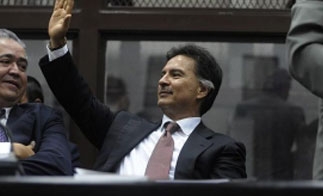Guatemala has announced that ex-President Alfonso Portillo will be extradited to the US, removing any possibility he can use the country’s notorious injunction, the “amparo,” to halt future proceedings. Despite praise for the ruling, the country still has much to do to address its weak judicial system.
Guatemala’s Constitutional Court ruled unanimously on August 29, that former President Portillo, who served in office from 2000-2004, can now be extradited to the US. Portillo was indicted by a court in the Southern District of New York on charges relating to the embezzlement and laundering of funds totalling $70 million.
The ex-head of state was arrested in January 2010 and faced trial in Guatemala last year on charges that he stole $15 million from the Defense Ministry during his time in office. He was acquitted in May 2011, though a Guatemalan court ruled in November that he should be extradited to the US.
The latest decision by the Constitutional Court affirms that Portillo will not be able to use an amparo, according to Siglo 21, a legal tool often utilized by Guatemalan criminals to delay extradition proceedings indefinitely on the grounds that it violates their constitutional rights.
US officials praised the court’s decision, reported the Associated Press, saying that it marked a development in Guatemala’s fight against impunity.
InSight Crime Analysis
Despite the fact the Constitutional Court removed the possibility of using the amparo, there are still legal channels Portillo can employ to avoid extradition, including filing a habeas corpus request that could force the US to withdraw its extradition order, Portillo’s defense lawyer outlined.
The ruling is still a positive development in pushing forward extradition proceedings, however, a legal process that has seen its share of delays in Guatemala. In June, the head of the International Commission Against Impunity in Guatemala (CICIG) lambasted the red tape and endless appeals that put a halt to extraditions.
To describe the Court’s decision as a development in the fight against impunity in Guatemala, though, is off the mark. Indeed, the verdict to acquit Portillo in the first place last year showed just how far Guatemala’s judicial system needs to progress in order to take on these cases itself and not rely on extradition.
Many important extradition rulings have been made this year involving prominent drug traffickers — among them alias “Juan Chamale,” and Walther Overdick — but these largely stemmed from the fact that they faced no charges in their home country, despite the seriousness of their alleged crimes.

